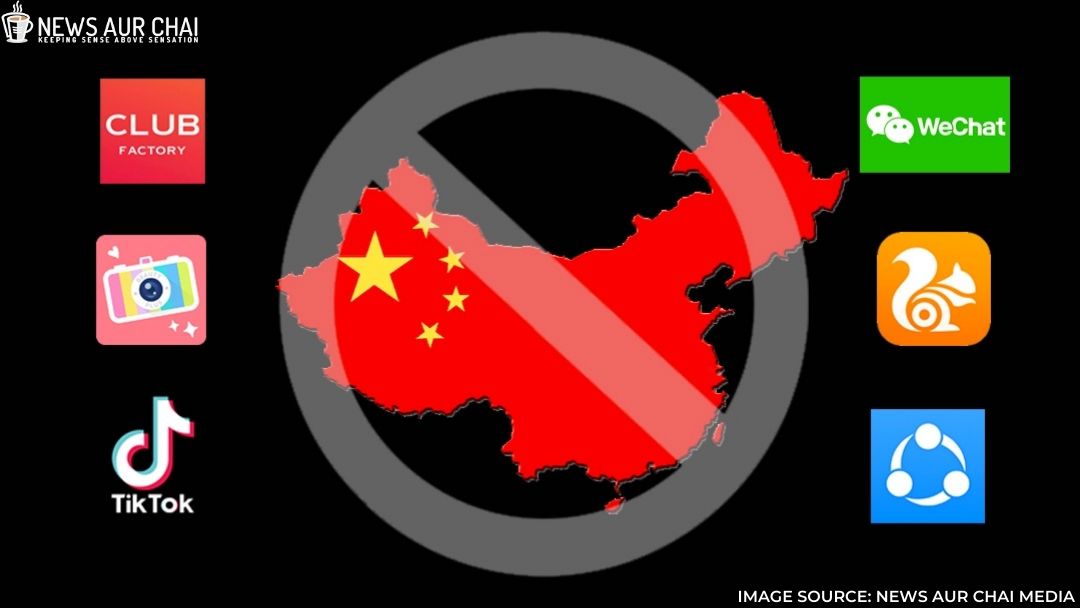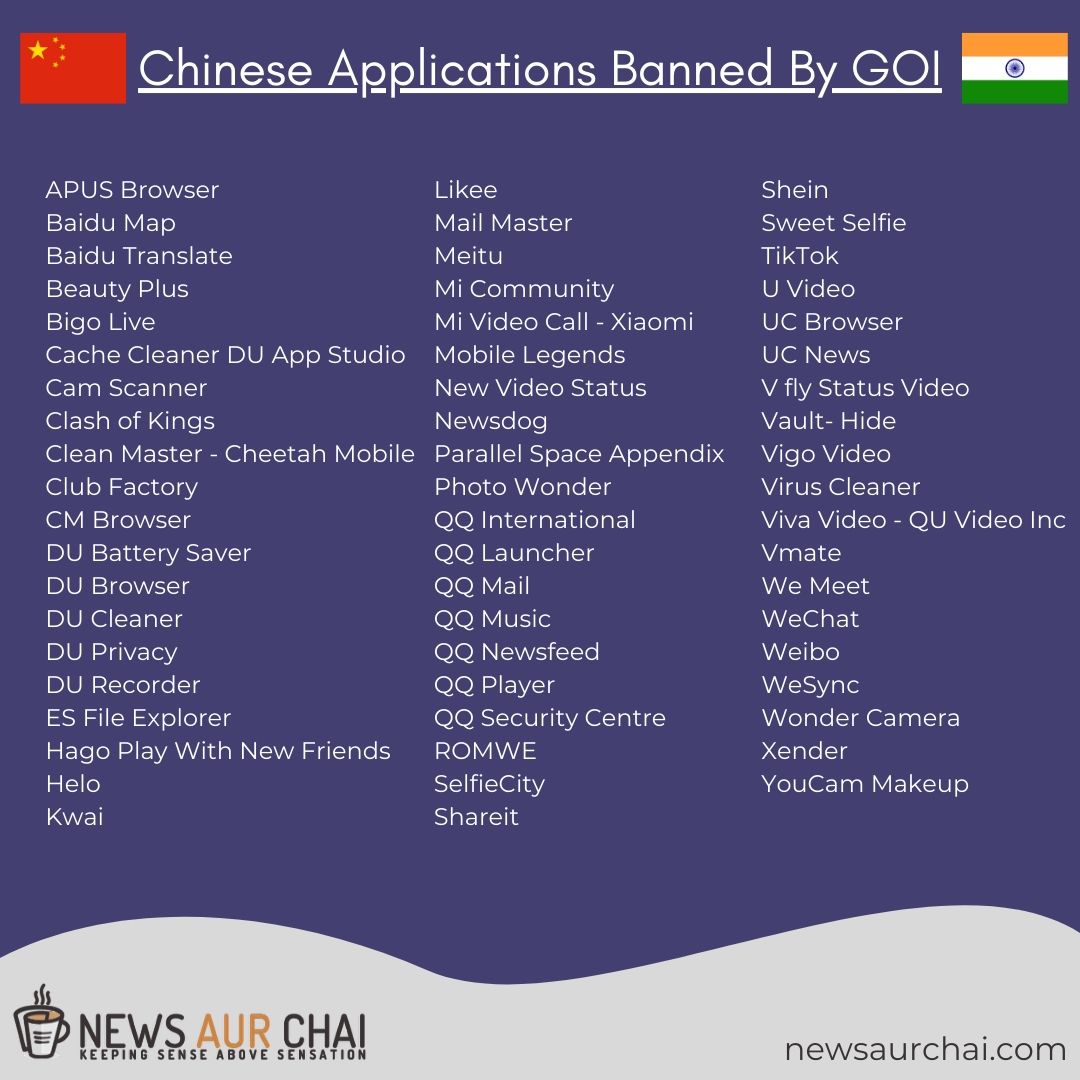Ban On Chinese Apps: Impact On “Stars”; Indo-Chinese Markets And Jobs

India banned 59 Chinese Apps on Tuesday, stating that the apps were “prejudicial to sovereignty and integrity of India, defence of India, security of the state and public order.”
The move comes in the backdrop of current stand-off along the Line of Actual Control (LAC) in Ladhak against the Chinese army. It is a huge blow for the Chinese technology companies.
The banned Chinese apps list includes popular ones like TikTok, UC Browser, ShareIt, and others.
Biggest Market:
The ban significantly narrows a top growth market for Chinese technology firms and may encourage other governments to follow the same.
The apps like TikTok, Tencent’s WeChat, Alibaba’s UC Browser and two of Xiaomi’s apps are enormously popular in India.
Messaging app WeChat has been downloaded more than 100 million times on Google’s Android; while TikTok remains the most prominent foreign driver for the app installation.
According to app analytics firm Sensor Tower, in April, around 611 million lifetime downloads, or 30.3 per cent of the total app Installation happened in India alone.
It is not for the first time that the video platform has been blocked. In April 2019, TikTok was temporarily banned in the country, for two weeks as the legislators believed the app would expose children to pornographic content, sexual predators, and cyberbullying. The app, however, soon gained back its momentum.
Beijing-headquartered ByteDance, the parent company of TikTok, had plans to invest 1 billion dollars, open a local data centre and had recently ramped up hiring in the country. The Government’s move has severely hampered ByteDance’s ambitions.
The company is already facing backlash in the United States as lawmakers are suspicious about Beijing’s access to consumer data.
New social media platforms like Helo and Likee, as well as a video chat app Bigo Live, are immensely prevalent among Indian youths as it reaches mass vernacular language audience who aren’t much comfortable in English.
How will it affect the Indian Job market/ youth?
Most of these platforms have Indian creators, for whom this is the only source of income. Many Indians use TikTok as a source of income by making video and sharing them. The app works similar to that of Youtube video, wherein the number of views can be redeemed in money. As per reports, Indian users spend an average of 38 minutes daily using TikTok.
Moreover, many of these apps have offices and employees in India, and a few thousand jobs could be at stake. In April 2020, it was reported that TikTok is looking forward to hire around 10,000 people worldwide along with people from India. A ban on these apps will lead to many to a hike in unemployment in India. (This line can be dropped too)
TikTok launched in 2016, gained its popularity after it merged with Musical.ly in 2018. This Chinese short video app is used to create, share, and view content based around lip-syncing, dancing, comedy skits, and other physical activities.
After facing a temporary ban the app launched an education program in October 2019, trying to enter the nation’s “good books”. The global pandemic, which confined the people to home, came as a blessing in disguise for the users these apps as the time spent in on the same increased dramatically.
Also, according to Omnicore April 2020 report, 41 per cent of all TikTok users are between 16 and 24 years of age. Considering the popularity of the app in India, the number of young minds influenced can be very high, which will indeed affect their behaviour as well.
— TikTok India (@TikTok_IN) June 30, 2020
However, this is the case of a single app among the ones banned; likewise, the other apps also have a considerable amount of effect in India and on the share market.
Legal side of the ban
The Ministry of Information and Technology said that it had received many complaints stating that the mobile apps are being misused for stealing and privately transmitting users’ data in an unauthorised manner to servers outside India. As this action is ultimately against the “sovereignty and integrity of the nation, defence of India, security of the state and public order,” a ban was inevitable.
TikTok was one among the apps alleged to have shared the data with the foreign Government. The app, however, denied this claim and said: “TikTok continues to comply with all data privacy and security requirements under Indian law and have not shared any information of our users in India with any foreign government, including the Chinese Government.”
The ban was enforced by invoking Section 69A and the Blocking Rules that allows the Government to block content under certain circumstances of the Information Technology Act, 2008.
69A gives power to issue directions for blocking public access of any information through any computer resource.
“Where the Central Government or any of its officer specially authorised by it in this behalf is satisfied that it is necessary or expedient so to do, in the interest of sovereignty and integrity of India, defence of India, security of the State, friendly relations with foreign states or public order or for preventing incitement to the commission of any cognizable offence relating to above, it may subject to the provisions of sub-section (2), for reasons to be recorded in writing, by order, direct any agency of the Government or intermediary to block for access by the public or cause to be blocked for access by the public any information generated, transmitted, received, stored or hosted in any computer resource.”
This major step of India may turn out to be an embodiment to other nations to take actions against and ban Chinese goods from penetrating and engraving out a large portion of the market share.







One Comment